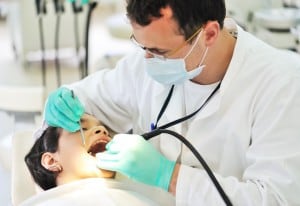UPDATE, August 11, 2015: We have been informed by a very keen-eyed and interested observer that the definition of “physician” under the Social Security Act includes dentists.
So we are not sure why the Texas Health and Human Services Commission has to get a waiver from CMS for something that is already in federal law.
Here is an excerpt from the statute along with its link:
Sec. 1861. [42 U.S.C. 1395x]
(r) The term “physician”, when used in connection with the performance of any function or action, means (1) a doctor of medicine or osteopathy legally authorized to practice medicine and surgery by the State in which he performs such function or action (including a physician within the meaning of section 1101(a)(7)), (2) a doctor of dental surgery or of dental medicine who is legally authorized to practice dentistry by the State in which he performs such function and who is acting within the scope of his license when he performs such functions, (3) a doctor of podiatric medicine for the purposes of subsections (k), (m), (p)(1), and (s).
 In the past legislative session, House Bill 1661 introduced by Rep. Bobby Guerra was passed unanimously by both the House and Senate and signed into law by Gov. Abbott. The purpose of the bill is to grant dental Medicaid providers the right to bill for services provided by a substitute dentist. This is the same privilege that physicians currently have under the Social Security Act.
In the past legislative session, House Bill 1661 introduced by Rep. Bobby Guerra was passed unanimously by both the House and Senate and signed into law by Gov. Abbott. The purpose of the bill is to grant dental Medicaid providers the right to bill for services provided by a substitute dentist. This is the same privilege that physicians currently have under the Social Security Act.
Need waiver from CMS
It appears that dental Medicaid providers will have to wait a few more months for this privilege as Texas must seek a waiver to allow the practice from the Centers for Medicaid and Medicare Services.
The following is a summary of the situation TDMR received:
House Bill (HB) 1661, 84th Legislature, Regular Session, 2015, directs the Health and Human Services Commission (HHSC) to adopt rules ensuring the same standards that apply to a physician who bills Medicaid for services provided by a substitute physician also apply to a dentist who bills Medicaid for services provided by substitute dentists. HHSC sought clarification from the Centers for Medicare and Medicaid Services (CMS) as to whether or not Section 1902(a)(32)(C) of the Social Security Act relating to substitute physicians can be applied to dentists. CMS recently informed HHSC that Section 1902(a)(32)(C) of the Act, dealing with practioners who provide a service pursuant to an employment relationship, only applies to physicians.
At this time, Texas Medicaid programs may not apply Section 1902(a)(32)(C) to substitute dentists. In an effort to comply with HB 1661 and address concerns brought forward by providers, HHSC plans to request a waiver from CMS to allow for the use of the substitute dentists for the reciprocal and locum tenens arrangement in Medicaid managed care. HHSC will advise stakeholders of any progress on this request.
TDMR will follow future developments.

